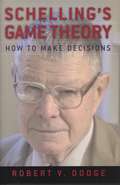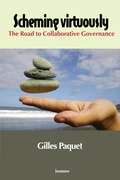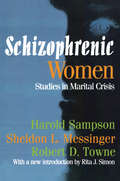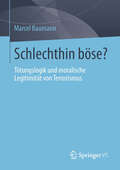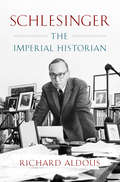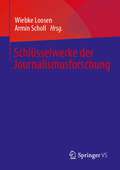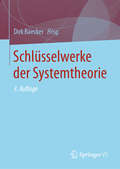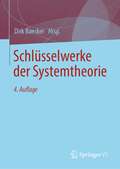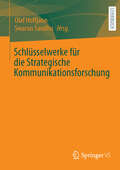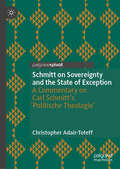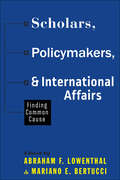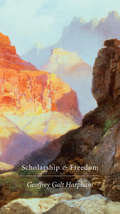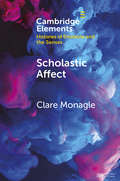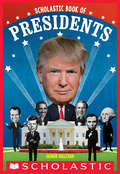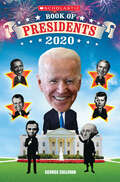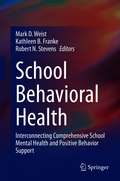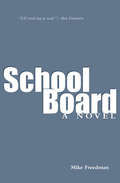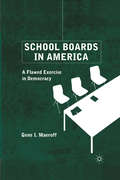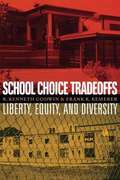- Table View
- List View
Sceptical Essays (Routledge Classics)
by Bertrand Russell'These propositions may seem mild, yet, if accepted, they would absolutely revolutionize human life.' With these words Bertrand Russell introduces what is indeed a revolutionary book. Taking as his starting-point the irrationality of the world, he offers by contrast something 'wildly paradoxical and subversive' - a belief that reason should determine human actions. Today, besieged as we are by the numbing onslaught of twenty-first-century capitalism, Russell's defence of scepticism and independence of mind is as timely as ever. In clear, engaging prose, he guides us through the key philosophical issues that affect our daily lives - freedom, happiness, emotions, ethics and beliefs - and offers no-nonsense advice.
Schelling's Game Theory: How to Make Decisions
by Robert V. DodgeThomas Schelling taught a course in game theory and rational choice to advanced students and government officials for 45 years.
Scheming Virtuously: The Road to Collaborative Governance
by Gilles PaquetScheming Virtuously: The Road to Collaborative Governance is an invitation to subversion, but also a somewhat personal account of the displacement of the dominant governing regime (Big-G centralized government) by small-g collaborative governance, in a world where power, resources, and information are widely distributed. In this new world, the citizen’s burden of office is clear: to be a producer of governance. Scheming virtuously is the order of the day—active engagement, imaginative problem-reframing, astute organizational design, and effective action within the bounds of the appreciative systems in good currency and beyond.
Schizophrenic Women: Studies in Marital Crisis
by Harold Sampson Sheldon L. Messinger Robert D. TowneSchizophrenic Women is a fascinating report on the lives of seventeen families that suffered the experiences associated with the hospitalization of the wife and mother for mental illness. A description and analysis of representative experiences is presented here in an attempt to investigate various key issues--the patterns of family living preceding the crisis leading to medical hospitalization; how the patterns fell apart; how personal and family crises became psychiatric emergencies; how the hospital experiences modified both the immediate crises and the earlier patterns of living--and how durable those changes were once the patients had returned home. The book goes beyond the immediate lives of the women and their families--the authors direct attention to patterns of psychiatric care and to the ways in which such crises as those experienced by these women and their families come to professional attention and are managed. The authors explore how help is found and used and some of the functions hospitalization serves for patients and their families. They point out some of the ways that traditional patterns of psychiatric care limit the power to observe, understand, and effectively influence a pathological course of events. In her new introduction to Schizophrenic Women, Rita J. Simon notes that, "Although the study was conducted in the 1950s, readers will recognize its current relevance and importance for scholars and the lay public interested in the problem of mental illness and intrafamily relationships."
Schlechthin böse?: Tötungslogik und moralische Legitimität von Terrorismus
by Marcel BaumannGlobale Phänomene wie politische Gewalt oder Terrorismus zu verstehen, ist eine große Herausforderung. Dieses Buch leistet hierzu einen Beitrag, indem die Problematik der Legitimität und Legitimation von Gewalt in den Mittelpunkt gestellt wird. Die Frage, unter welchen Bedingungen Gewalt legitim ist, wird aus der Perspektive der Gewaltakteure gestellt. Denn Legitimität ist keine für immer garantierte Eigenschaft, sondern sie muss stets aufs Neue geschaffen werden. Deshalb müssen sich "Terroristen" permanent der legitimitätssuchenden Selbstverständigung stellen: die Rechtfertigung des eigenen Gewalthandelns in den Augen der Gemeinschaft. Die Analyse möchte dazu beitragen, politische Gewalt anders sehen zu lernen. Sie ist interdisziplinär angelegt, indem sie Politische Philosophie, verstehende Soziologie und Moralphilosophie integriert.
Schlesinger: The Imperial Historian
by Richard AldousThe first major biography of preeminent historian and intellectual Arthur Schlesinger Jr., a defining figure in Kennedy’s White House. Arthur M. Schlesinger Jr. (1917–2007), known today as the architect of John F. Kennedy’s presidential legacy, blazed an extraordinary path from Harvard University to wartime London to the West Wing. The son of a pioneering historian—and a two-time Pulitzer Prize and National Book Award winner in his own right—Schlesinger redefined the art of presidential biography. A Thousand Days, his best-selling and immensely influential record of the Kennedy administration, cemented Schlesinger’s place as one of the nation’s greatest political image makers and a key figure of the American intellectual elite—a peer and contemporary of Reinhold Niebuhr, Isaiah Berlin, and Adlai Stevenson. The first major biography of this defining figure in Kennedy’s Camelot, Schlesinger: The Imperial Historian presents a dramatic life and career set against the backdrop of the American Century. Biographer Richard Aldous draws on oral history, rarely seen archival documents, and the official Schlesinger papers to craft a portrait of the incandescently brilliant and controversial historian who framed America’s ascent to global empire.
Schlüsselbegriffe der Sozialplanung und ihre Kritik (Sozialraumforschung und Sozialraumarbeit #23)
by Mario Rund Friedhelm PetersSozialplanung kann eine wichtige Grundlage für die Gestaltung der Lebensbedingungen in denen Städten, Kreisen und Regionen sowie für die Sicherung der kommunalen Daseinsvorsorge darstellen. Wie sie diese Funktion jedoch wahrnimmt, wird maßgeblich von ihren politisch-administrativen Einbettungen sowie ihren inhärenten Rationalitäten und Wissensbeständen bestimmt.Ihre diskursiv verfasste Praxis gilt es gesellschaftstheoretisch und -politisch zu verstehen und zu kontextualisieren. Hierzu möchte der vorliegende Band Anregungen bieten. Daher versammelt er 15 zentrale Begriffe mit denen das Professions- und Handlungsfeld erschlossen werden kann.Der InhaltBeratung – Digitalisierung – Geschlecht / Gender – Gleichwertigkeit – Governance – Integrierte Planung – Kommunale Sozialpolitik – Mobilität – Netzwerke – Partizipation – Sozialberichterstattung – Sozialraum – Sozialraumentwicklung – Steuerung – WirkungDie ZielgruppenLehrende und Studierende der Sozialen Arbeit, der Politik-, Kultur- und Verwaltungswissenschaften sowie der Architektur und der Raumplanung.Praktiker*innen der Sozialplanung, der Sozialen Arbeit, der Sozialraumarbeit, der Stadtteilarbeit, der Gemeinwesenarbeit, des Quartiermanagements u. Ä.Die HerausgeberDr. Mario Rund ist Professor für Soziale Arbeit im Gemeinwesen an der Hochschule Darmstadt.Dr. Friedhelm Peters ist em. Professor für Theorien Sozialer Arbeit an der Fachhochschule Erfurt und der Ev. Hochschule Dresden.
Schlüsseltexte der ‚Neuen Rechten‘: Kritische Analysen antidemokratischen Denkens (Edition Rechtsextremismus)
by David MeieringMit Begriffen, Bildern und Theorien arbeitet die ‚Neue Rechte‘ an der kulturellen Hegemonie. Ihre Diskursarbeit inszenieren sie als gefährliches, dunkles Denken. Der vorliegende Band entmystifiziert diese Selbstdarstellung, indem er ihre ‚Schlüsseltexte‘ kritisch liest, dechiffriert und in den Kontext antidemokratischen und menschenfeindlichen Denkens einordnet. Als analytische Miniaturen zeigen die Beitrage das diskursive Handwerk und die argumentative Architektur der ‚Neuen Rechten‘ auf. So gelingt Aufklärung über ‚neurechte‘ Strategien in Schulen, Universitäten und in der Öffentlichkeit.
Schlüsselwerke der Journalismusforschung
by Wiebke Loosen Armin SchollWie in anderen Forschungsfeldern gibt es auch in der Journalismusforschung Schlüsseltexte, die ein Forschungsgebiet erschlossen haben, auf dem weitere Forschung aufbaut. Der Band versammelt solche Schlüsselwerke und stellt sie in Kurzbeschreibungen vor. Zusätzlich werden sie in den Forschungskontext eingebettet und ihre Wirkung auf den weiteren Fortgang der Forschungstradition erläutert. Schließlich werden sie in Bezug auf ihre Bedeutung für aktuelle Fragen und Themen der Journalismusforschung eingeschätzt.
Schlüsselwerke der Systemtheorie
by Dirk BaeckerDie Systemtheorie ist ein Versuch, Beschreibungen für Phänomene zu finden, die weder so einfach sind, dass sie kausal, noch so zufällig, dass sie statistisch beschrieben werden können. In der Systemtheorie geht es um Phänomene der Selbstorganisation und um die Frage, wie der Beobachter mit einer Begrifflichkeit ausgestattet werden kann, die es ihm erlaubt, zu begreifen, dass er mit seinen Beschreibungen ein Teil der Welt ist und nicht in einem unbestimmten Außerhalb agiert.
Schlüsselwerke der Systemtheorie
by Dirk BaeckerDie Systemtheorie ist ein Versuch, Beschreibungen für Phänomene zu finden, die weder so einfach sind, dass sie kausal, noch so zufällig, dass sie statistisch beschrieben werden können. In der Systemtheorie geht es um Phänomene der Selbstorganisation und um die Frage, wie der Beobachter mit einer Begrifflichkeit ausgestattet werden kann, die es ihm erlaubt, zu begreifen, dass er mit seinen Beschreibungen ein Teil der Welt ist und nicht in einem unbestimmten Außerhalb agiert.
Schlüsselwerke der Wirtschaftssoziologie (Wirtschaft + Gesellschaft)
by Klaus Kraemer Florian BruggerDas Buch bietet einen fundierten Überblick über die zentralen Inspirationsquellen und Schlüsselwerke der Wirtschaftssoziologie und ordnet sie historisch wie systematisch ein.Die moderne Wirtschaft ist ohne soziologisches Wissen über ihre sozialen, kulturellen und politisch-institutionellen Grundlagen nicht angemessen zu verstehen. Von dieser Grundannahme ausgehend untersucht die Wirtschaftssoziologie Märkte und Unternehmen, Geld und Eigentum, Tauschformen und Wirtschaftsordnungen. Wie wirken Netzwerke und Kooperationen, Wertideen und Konventionen, Konflikte und Machtasymmetrien auf Märkten und in Unternehmen? Wie bilden sich Preise? Was sind ökonomische Werte? Welchen Einfluss haben kulturelle und staatliche Ordnungen auf Wirtschaftssysteme? Wie kann der Aufstieg und der Niedergang von Märkten soziologisch erklärt werden? Warum sind zahllose Tauschbeziehungen in modernen Gesellschaften marktförmig organisiert, während in anderen Bereichen Märkte abgelehnt werden oder sogar untersagt sind?
Schlüsselwerke für die Strategische Kommunikationsforschung
by Olaf Hoffjann Swaran SandhuDie strategische Kommunikationsforschung hat seit jeher Theorien anderer kommunikationswissenschaftlicher Forschungsfelder und wissenschaftlicher Disziplinen aufgegriffen, um mit diesen den eigenen Beobachtungsgegenstand zu beschreiben. Wenn man das als Defizit sehen möchte, beklagt man schnell den fehlenden eigenen Kern des Forschungsfeldes. Der Band „Schlüsselwerke für die strategische Kommunikationsforschung“ versteht dies ausdrücklich als Stärke und wirbt für die Potenziale dieser offenen Vorgehensweise. Wie arm wäre die strategische Kommunikationsforschung ohne Giddens, Goffman, Habermas, Luhmann, Meyer & Rowan, Weick und Co? Daher stehen in dem Band keine Schlüsselwerke der, sondern Schlüsselwerke für die strategische Kommunikationsforschung im Mittelpunkt. Die 42 vorgestellten Schlüsselwerke haben die strategische Kommunikationsforschung in der Vergangenheit geprägt oder haben das Potenzial, sie in den nächsten Jahren nachhaltig zu beeinflussen. Der Band ist in die fünf Abschnitte Strategie & Kommunikation, Gesellschaft & Öffentlichkeit, Organisation & Entscheidung, Wirkungen & Wirklichkeit(en) und Macht & Kritik gegliedert. Jeder Abschnitt beginnt mit einem einführenden Überblicksbeitrag, der die Schlüsselwerke einordnet und einen Überblick über die zentralen Fragen und Diskurse des jeweiligen Forschungsbereichs gibt.
Schmitt on Sovereignty and the State of Exception: A Commentary on Carl Schmitt's 'Politische Theologie' (Palgrave Studies in Classical Liberalism)
by Christopher Adair-ToteffThis Palgrave Pivot offers a balanced and impartial commentary on one of the most important of the early writings by the German legal scholar Carl Schmitt. The book is known mostly by its title Politische Theologie but Schmitt&’s subtitle indicated that his book was on more than political theology, but was focused on conceptions of sovereignty, authority, and the &‘state of exception&’. The author shows how the Politische Theologie published in 1922 clearly formulated Schmitt&’s thinking regarding decisionism, dictatorship, and sovereignty, and how these notions intertwined to propose a governmental model opposed to parliamentary democracy. The book illuminates Carl Schmitt&’s role in theorising the &‘state of exception&’ as he engaged in debates with those who contended that democratic principles were crucial. Schmitt insisted there needs to be a sovereign individual whose authority provides an immediate decision to the &‘state of exception.&’ This book will be of interest to scholars of legal and political philosophy, as well as those interested broadly in ideas of classical liberalism, wartime political economy, authoritarianism and socio-economic influences on legal thinking.
Schnittpunkt Politische Bildung: Innovative Ansätze und fächerübergreifende Perspektiven (Politische Bildung)
by Marc Partetzke Isabelle-Christine Panreck Luisa GirnusDie multiplen Krisenerscheinungen unserer Zeit bleiben nicht ohne Konsequenzen für die Politische Bildung, zu deren Zielen die Befähigung ihrer Adressat:innen zur kompetenten Teilnahme und Teilhabe am gesellschaftlichen Leben gehört. Insofern verwundert es denn auch nicht, dass sich die Praxis Politischer Bildner:innen aus ganz unterschiedlichen wissenschaftlichen Disziplinen speist. Der Band nimmt sowohl Schnittmengen der Politikdidaktik mit anderen wissenschaftlichen Disziplinen als auch die der Politischen Bildung mit anderen Domänen in den Blick und will die spezifischen Perspektiven auf die globalen Herausforderungen unserer Zeit in einen konstruktiven Austausch bringen.
Schnittstellen in der Sozialpolitik: Analysen am Beispiel der Felder Berufsorientierung und Rehabilitation
by Sybille Stöbe-Blossey Marina Ruth Martin Brussig Susanne DrescherSchnittstellen entstehen, wenn es für Menschen in sozialen Risikosituationen Hilfen von unterschiedlichen Institutionen gibt. Das Buch präsentiert empirische Ergebnisse zur Arbeit an Schnittstellen in den Feldern „Berufsorientierung“ und „Rehabilitation“ und legt einen übergreifenden Analyserahmen zur Gestaltung von Schnittstellen im entwickelten Sozialstaat vor.
Scholars, Policymakers, and International Affairs: Finding Common Cause
by Abraham F. Lowenthal and Mariano E. BertucciHow to strengthen both academic research and international policies by improving the connections between scholars and policymakers.Scholars, Policymakers, and International Affairs shows how to build mutually beneficial connections between the worlds of ideas and action, analysis and policy. Drawing on contributions from top international scholars with policy experience in the United States, Europe, Asia, Canada, and Latin America, as well as senior policymakers throughout the Americas, Abraham F. Lowenthal and Mariano E. Bertucci make the case that scholars can both strengthen their research and contribute to improved policies while protecting academia from the risks of active participation in the policy process.Many scholars believe that policymakers are more interested in processes and outcomes than in understanding causality. Many policymakers believe that scholars are absorbed in abstract and self-referential debates and that they are primarily interested in crafting theories (and impressing other scholars) rather than developing solutions to pressing policy issues.The contributors to this book confront this gap head-on. They do not deny the obstacles to fruitful interaction between scholars and policymakers, but, drawing on their own experience, discuss how these obstacles can be and have been overcome. They present case studies that illustrate how scholars have helped reduce income inequality, promote democratic governance, improve gender equity, target international financial sanctions, manage the Mexico–U.S. border, and enhance inter-American cooperation. These success stories are balanced by studies on why academic analysts have failed to achieve much positive impact on counternarcotics and citizen security policies. The editors’ astute conclusion identifies best practices and provides concrete recommendations to government agencies, international institutions, nongovernmental organizations, and funding sources, as well as to senior university officials, academic departments and centers, think tanks, established scholars, junior faculty, and graduate students.Clearly written and thoughtfully organized, this innovative book provides analytic insights and practical wisdom for those who want to understand how to build more effective connections between the worlds of thought and action.
Scholarship and Freedom
by Geoffrey Galt HarphamA powerful and original argument that the practice of scholarship is grounded in the concept of radical freedom, beginning with the freedoms of inquiry, thought, and expression. Why are scholars and scholarship invariably distrusted and attacked by authoritarian regimes? Geoffrey Galt Harpham argues that at its core, scholarship is informed by an emancipatory agenda based on a permanent openness to the new, an unlimited responsiveness to evidence, and a commitment to conversion. At the same time, however, scholarship involves its own forms of authority. As a worldly practice, it is a struggle for dominance without end as scholars try to disprove the claims of others, establish new versions of the truth, and seek disciples. Scholarship and Freedom threads its general arguments through examinations of the careers of three scholars: W. E. B. Du Bois, who serves as an example of scholarly character formation; South African Bernard Lategan, whose New Testament studies became entangled on both sides of his country’s battles over apartheid; and Linda Nochlin, whose essay “Why Have There Been No Great Women Artists?” virtually created the field of feminist art history.
Scholastic Affect: Gender, Maternity and the History of Emotions (Elements in Histories of Emotions and the Senses)
by Clare MonagleScholastic theologians made the Virgin Mary increasingly perfect over the Middle Ages in Europe. Mary became stainless, offering an impossible but ideologically useful vision of womanhood. This work offers an implicit theory of the utility and feelings of women in a Christian salvationary economy. The Virgin was put to use as a shaming technology, one that silenced and effaced women's affective lives. The shame still stands to this day, although in secularised mutated forms. This Element deploys the intellectual history of medieval thought to map the moves made in codifying Mary's perfection. It then uses contemporary gender and affect theory to consider the implications of Mary's perfection within modernity, mapping the emotional regimes of the medieval past upon the present.
Scholastic Book of Presidents (Scholastic Inc Reference Non-fiction Ser.)
by George SullivanMeet America's newest president and get caught up on past commanders-in-chief in this revised edition of a classic, now updated with a brand new modern design!Hail to the Chief! Get ready to meet all of our nation's presidents, from George Washington to Barack Obama, and everyone in between, including a section on Donald Trump, our newest president elected in 2016. This easy-to-read book offers mini biographies and fun facts about each president's accomplishments in the Oval Office and beyond, accompanied by photographs and lists of key events.A must-have for any classroom or young history buff, the Scholastic Book of Presidents covers everything you need to know about America's greatest leaders from past to present.
Scholastic Book of Presidents 2020 (Scholastic Inc Reference Non-fiction Ser.)
by George SullivanRefresh your knowledge of the leaders who took our nation's highest office with this easy-to-read, fact-filled book of mini biographies on everyone from George Washington to Donald Trump, and catch up on all the biggest news from the 2020 election season. The Scholastic Book of Presidents will tell you:- Which president spoke the most languages?- Who was the last president to keep a full beard?- Which president has served in office the longest?Alongside photographs and lists of key events, this book covers everything you need to know about each president's major accomplishments in and out of the Oval Office. A must-read for history buffs, educators, and anyone with a budding interest in politics, past or present.
School Behavioral Health: Interconnecting Comprehensive School Mental Health and Positive Behavior Support
by Mark D. Weist Kathleen B. Franke Robert N. StevensThis book examines the prevalence of emotional and behavioral problems in youth and the implications of little or low-quality mental health services available for them. It describes aspects of Positive Behavioral Interventions and Supports (PBIS) and school mental health (SMH) that work together to form a comprehensive service delivery model called the Interconnected Systems Framework (ISF). The term school behavioral health (SBH) is used to describe SMH and PBIS working together, as in the ISF. The book examines perspectives of key stakeholders through a series of research forums, during which participants identified critical themes for the advancement of SBH in South Carolina and the southeast region of the United States. Chapters address key themes of school behavioral health from these forums, such as collaboration, schoolwide approaches, quality of services, and support for specific populations, including military families and youth involved in the juvenile justice and child welfare systems. The book addresses barriers to providing behavioral health services at school as well as recommendations from key stakeholders for advancing SBH along these critical dimensions. This volume is a must-have resource for researchers, professors, and graduate students as well as practitioners, clinicians, and therapists across such interrelated disciplines as clinical child and school psychology, educational policy and politics, social work, public health, school counseling, family studies, juvenile justice, child and adolescent psychiatry, and child welfare and well-being services.
School Board
by Mike Freedman"School Board is a total joy to read, as full of sass and subversive brass as its 18-year-old hero, the political neophyte and Houston school board candidate Tucker 'Catfish' Davis ... I hope School Board is the first of many more to come from this gifted young writer."-Ben Fountain, author of National Book Critics Circle Award winner Billy Lynn's Long Halftime Walk and Brief Encounters with Che Guevara"Into the riotous cavalcade of great American literary characters tumbles a new class clown, Tucker 'Catfish' Davis, high school senior and aspiring politician. One part Ignatius J. Reilly from A Confederacy of Dunces, one part Hazel Motes from Wise Blood, and several parts Willie Stark from All the King's Men, Catfish Davis is a singular presence on the page. Mike Freedman hasn't just written the funniest book about a school board election, he's written the kind of David-and-Goliath story that gets all of us 'little people' cheering and laughing in equal measure."-David Abrams, author of Fobbit Houston, Texas, 1999. Enter Tucker "Catfish" Davis, a high school senior with high-flying political ambitions as the self-proclaimed heir to populist Louisiana Governors Huey and Earl Long. Armed with idealism and a fedora, he embarks on a quixotic campaign to get elected to the local school board in an effort to help the "little people" of Houston.In the wild days that follow, Catfish's long-shot bid gains traction through guerilla campaigning against a questionable tax deal supported by his opponent, a powerful executive at an Enron-esque energy company. With the help of his classmates, an indicted Louisiana governor, a gay journalist with nascent mayoral ambitions and an ex-Green Beret trained to wage unconventional warfare, Catfish makes it a race Houston will never forget.Based on an actual 1999 news story, School Board is an entertaining but satirical debut novel that revels in the diversity, madness and absurdities of the Bayou City.
School Boards in America
by Gene I. MaeroffSchool boards spend almost $500 billion in taxpayer-provided funds, they employ more than 6 million people, offering pensions and lifetime health benefits that have helped build the obligation that has put state governments in fiscal peril. This book lifts the veil of obscurity from school boards and makes readers think about the issues.
School Choice Tradeoffs: Liberty, Equity, and Diversity
by R. Kenneth Godwin Frank R. KemererEducational policy in a democracy goes beyond teaching literacy and numeracy. It also supports teaching moral reasoning, political tolerance, respect for diversity, and citizenship. <P>Education policy should encourage liberty and equality of opportunity, hold educational institutions accountable, and be efficient. School Choice Tradeoffs examines the tradeoffs among these goals when government affords parents the means to select the schools their children attend. <P><P> Godwin and Kemerer compare current policy that uses family residence to assign students to schools with alternative policies that range from expanding public choice options to school vouchers. They identify the benefits and costs of each policy approach through a review of past empirical literature, the presentation of new empirical work, and legal and philosophic analysis.

